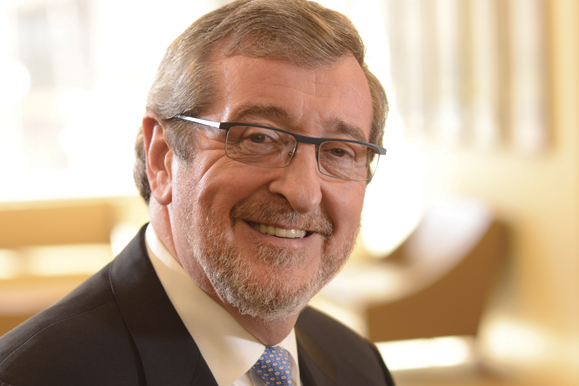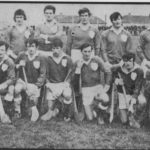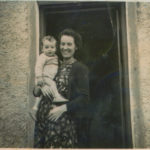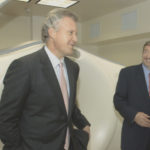2013 BUSINESS 100 KEYNOTE INTERVIEW
Michael J. Dowling’s winning spirit, unbreakable determination, and willingness to take risks have propelled him forward and inspired and motivated those around him.
There’s a story that Michael J. Dowling, president and CEO of North Shore-LIJ Health System, sometimes returns to. The eldest of five children growing up in the rural village of Knockaderry in West Limerick, he had to help support his family from an early age. One evening he went to get milk from a local farmer, who, Dowling recalls, always seemed very rich in comparison to his own family. “When I got there, his son was getting ready to go off to college, which was a dream of mine. And the father looks at me and he says, ‘Isn’t it too bad somebody like you will never be able to get to college?’ I walked home that night, and – it’s like it happened yesterday – every step I took, I said, ‘I’m going to college. I’m going to college. I’m going to college.’ I was determined. Negative things can be the greatest positive motivators. Because if you tell me I can’t do something, that’s when I become determined to get it done.”
This no-nonsense determination has been the hallmark of Dowling’s career and personal journey. He grew up in a thatched cottage without indoor plumbing or electricity. His father disabled by severe arthritis and his mother hearing impaired, Dowling assumed the responsibility of supporting his family as young as fifteen years old, traveling to England during the summer to work in a steel mill in Crawley. He was accepted to college – a first for the family – at University College Cork (UCC), but had to find a way to pay tuition and continue to send money home. Before starting at UCC, in the summer of 1963, he went to the U.S., to New York, on a J–1 visa. At just 17, Dowling committed himself to finding as much work as possible and made the journey every year until graduating. He worked on the docks, in the engine rooms of the Circle Line tour boats, in construction, as a plumber, cleaning out bars in the early morning hours, as a school custodian.
“You name it, I did it,” he says. “When you’re in a bad situation, you just do what you have to do. I have pay slips for 120-hour-work-weeks. It would have been nice to have a social life, but that wasn’t important. I never thought that any circumstance along that trajectory was in any way bad, because it was still better than what had come before. Every day that I got a paycheck, I was the happiest guy in the world. And being able to send a check home to my parents, that was the best part of every week.”
The most challenging part was communication. “I’d write home, and it would take two weeks for the letter to get there. Then my family would write back, which would take another two weeks. So close to a month would go by before I would know that they knew that I was okay,” he remembers. “There was a phone kiosk next to the church in the village near where we lived, but it only worked sporadically. If we wanted to talk on the phone, I would have to write that I would call the village phone at a certain date and time two weeks away. It only worked 40 percent of the time. My brother would communicate what I was saying to my mother, who was deaf, and I would hear her in the background saying ‘What did he say? Is he all right?’ That was the hardest.”
But Dowling is living proof that hard work pays off. After graduating from UCC in four years (that farmer’s son took six to earn his degree, he mentions with measured glee), he returned to New York and eventually enrolled part time at Fordham University, where he completed his master’s in social policy. During this time, he met and married his wife, Kathy, with whom he has two children, both currently working in health care – Brian is an Imaging Supervisor at one of North Shore–LIJ’s facilities on Long Island, and Elizabeth is a registered nurse working in oncology.
In 1979, Dowling joined Fordham’s faculty as director of the campus in Tarrytown, and then served as a professor of social policy and assistant dean at the Graduate School of Social Services.
When Mario Cuomo was elected Governor of New York in 1983, he asked Dowling to come on board, eventually advancing the Irishman to serve as his deputy secretary and director of health, education and human services. As an immigrant and the son of immigrants, the two often saw eye-to-eye. During his twelve years in Albany, Dowling worked closely with the governor on issues ranging from homelessness and the crack epidemic to Medicare and Medicaid.
When Cuomo’s reign ended in 1995, Dowling was recruited by the insurance giant Empire Blue Cross Blue Shield as a senior vice president, but was lured away a few months later to take the post of SVP, Hospital Services at North Shore–LIJ Health System, then a small group of Long Island hospitals. He was promoted to executive vice president and chief operating officer in 1997, and was named president and CEO in 2002.
Over his eleven years at the helm, Dowling has transformed North Shore–LIJ into a shining example of how health systems can thrive by adapting. With 16 hospitals, 400 ambulatory care facilities and 2,400 full-time physicians in the North Shore–LIJ medical group, it is the nation’s third-largest non-profit secular health care system, and New York state’s largest integrated health care network. It is home to the highly respected Center for Learning and Innovation – the largest corporate university in the health care industry, modeled after GE’s Crotonville – as well as the Patient Safety Institute, the biggest patient simulation center in the U.S. In 2011, Dowling also ushered in the Hofstra North Shore–LIJ School of Medicine at Hofstra University, which, as it trains all first-year students as EMTs, is challenging the traditional structure of how medical students learn to be doctors.
Dowling is equally fearless when it comes to shaking up the way the health system is structured, placing a greater emphasis on out-patient care and, just this year, establishing a license for North Shore–LIJ to function as a commercial health insurance provider. Significantly, at a time when many hospitals – especially those in New York – are struggling to stay out of the red, through a strategic series of mergers and acquisitions, groundbreaking initiatives and close attention to management and personnel, North Shore–LIJ has maintained profitability, with $6.7 billion in annual revenue.
In the world of hospital administration, Dowling is unusual in his hands-on approach: he functions as the CEO of each separate North Shore–LIJ entity and spends every Monday morning meeting the system’s new employees, typically 100 per week. With 46,000 employees, North Shore–LIJ is the largest private employer in New York state.
Dowling is also slightly unusual in that he doesn’t come from a medical or business background. But one gets the sense that part of what makes him such an effective, far-seeing leader is his diverse array of life experiences. He can quite realistically imagine the world-view of a custodian in one of his hospitals just as easily as he can inhabit the perspective of one of the professors at the medical school. He can guess how both a member of the state government and an insurance executive will respond to one of the hospital system’s new projects. He can also see things through the eyes of one of their 4 million patients, because he is one of them. Just a week before Irish America met with Dowling at North Shore–LIJ’s Manhattan offices, he had undergone back surgery to correct ongoing damage from his days as a hurler for University College Cork. He was also privileged to play for the Limerick team that won the National League Championship. (That same team won the All Ireland in 1971, while Dowling was working over here, something he seems a tad wistful about to this day.)
“But this is a great example of what we’re trying to achieve!” he said, energetically tapping the conference room table and raising his still distinctly Limerick voice. “The back surgeon I go to, he will do everything possible to keep you from having surgery. He’ll tell you up front, ‘In 80-90 percent of cases, there is no need for back surgery, so we’re not going there unless there’s no other alternative.’ That was my case this year, but for the last 20 years, I didn’t have surgery.
“The thing is,” he added, broadening, as he often does, his use of “I” to mean North Shore–LIJ in the larger sense, “the way insurance payments typically work now, I make a lot of money to do surgery. But if I treat you with massage therapy or rehab, I don’t make any money off of you. So incentives are misaligned.”
In many respects, this is the central dilemma of the health care industry today: what’s best for patients isn’t always what makes the most money. And health care is, at the end of the day, a business. With his fearless, entrepreneurial approach, Dowling navigates this murky territory with apparent ease and has been lauded by the industry and beyond for doing so. This year, he was ranked 25th in Modern Healthcare magazine’s annual listing of the Top 100 Healthcare Leaders, up 13 slots from the previous year. He was the recipient of the 2012 B’nai B’rith National Healthcare Award, the 2011 Gail L. Warden Leadership Excellence Award from the National Center for Healthcare Leadership, and the American Irish Historical Society’s Gold Medal. He is also a recipient of the Ellis Island Medal of Honor.
Over the course of the Business 100 keynote interview, Dowling discussed his pioneering vision for North Shore–LIJ as it modernizes practices and realigns incentives, his hands-on approach to leadership, and the inspiring lessons of his determined rise.
Where did the desire for education come from?
Even though we didn’t have much, my mother always made books available. I grew up reading Shakespeare, and the American author Zane Grey who I loved. I was fascinated by the way he was able to write so that you could visualize what the American West looked like, even if you’d never been there. Later on, when I started to do public speaking, I always tried to present something [in a way that] the audience could see it, so you’re telling a story.
I realized very, very young that there wasn’t much available in Ireland for me. I could milk cows, which I did; I could kill pigs, which I did; and there wasn’t much else. So if I wanted to get ahead I had to move on. My father never really understood it, but my mother did. She was a very strong model. She was big into education even though she had no education herself. She always wanted you to not let your current circumstances limit your potential. You had the potential to do what you aspired, to aim high. You might not get completely there, but you will go a distance. I still talk to people about that.
She was deaf, though in her mind she had no disability – she probably knew what was going on a hell of a lot more than most people. She still knew how to speak because she lost her hearing at the age of 6 or 7 – I’ve investigated this, and I believe that it was from a cold medication they gave her, which when taken in the wrong dosage could cause hearing loss. I believe [her deafness] is why she had such a phenomenal interest in reading. The book became her partner – she didn’t have to listen to it, she could read it. So in part, the disability in one respect created a wonderful interest in another, which I then benefited from.
How has the Affordable Care Act impacted on what you do?
We were already doing a lot of what’s in the ACA. In fact, a lot of what’s in the ACA came out of the lessons learned from many of the health care organizations doing good things. Overall, I’ve tried to not get consumed by the ACA and to move forward the way I think we should. It’s an exciting time to be in health care. We can do a much better job and we should be promoting transparency, we should be figuring out how to get the costs down and continually enhance the quality. You have to be leading these days; you have to be ahead of the game. I don’t sit there waiting for what’s going to happen. I try to challenge the status quo and figure out how we can help create the future.
Is that why you decided that North Shore–LIJ should also become an insurance provider?
This is a major innovative step for the organization. We want to be in the business of providing health as well as treating illness. The present method of payment – fee-for-service – pays only for illness treatment. Being an insurer as well as the provider allows us to do both. It allows us to properly align incentives so we can better coordinate care, enhance quality and get better results.
There is no perfect answer – it’s a continuous process of improvement. But change is necessary and overdue and we want to be a leader.
There is another issue that is of utmost importance – individuals need to have more skin in the game. A significant portion of major illness (some argue 70%) is self created. We don’t exercise, we smoke, we drink, we take drugs, we sit on the couch, we are lethargic. Behavior and lifestyle changes are essential if we are to truly reform health care. Just think of obesity and all its attendant consequences – which the U.S. has in abundance.
The question, of course, is how to appropriately address these issues. If you come to one of our facilities and you’re sick, you have no problem being treated and told what to do. But if you’re not ill, and I know you’re going to get ill, and I tell you to change [your lifestyle], you’re going to say something like, “It’s none of your business. I’ll eat what I want to eat, I have freedom.”
Are hospitals becoming less central to how people are treated?
Ten years ago, a lot of things had to be done in a hospital, but with advancements in science and technology, that isn’t the case anymore. In our health system, with just a few exceptions, if you need basic surgery you go to an outpatient facility. I had knee surgery recently. Three years ago I would have been in hospital for a few days. Instead, I went to an ambulatory site at 6:30 a.m., had the surgery at 7:30 a.m., and I was home in my house at 12 noon.
We have 16 hospitals but we also have 400 ambulatory/outpatient locations and extensive home care programs. Most care can now be provided outside the hospitals with better outcomes and fewer complications.
It isn’t overly complicated when you break it down. The consumers – and I like to talk about health care as being in the consumer business because it’s what consumers want that matters – not just what providers want to deliver. They want good quality, they want convenience, they want good service and they want to be treated by a kind, confident and competent staff. So we are rethinking the whole way we do business. And if we do it right everybody will benefit.
When did you first become interested in health care?
It began when I was young, because of the circumstances with my family. It really blossomed when I had the privilege of working for Governor Mario Cuomo. As Director of Health and Human Services, I got immersed in both the public policy and the operational aspects of health care. It was a transformative time for me. As a result, I aspired to leading a health care organization, and fortunately, I got the opportunity.
I owe a lot to the many people who took a risk and showed confidence in me.
How do you find that person who’s a good hire?
You are looking for people with integrity, with passion, with commitment and with a positive can-do attitude. You also want people who are team-oriented and have good interrelationship skills.
All potential hires go through a thorough screening and prior to starting employment, they undergo a comprehensive orientation program. In a big system like ours, we recruit many different kinds of people – nurses and physicians, technicians and statisticians; HR and financial people, carpenters, laundry and construction workers. It’s a multi-faceted organization with multiple diverse businesses.
We also have a sophisticated high potential training program. Each year we identify between 50-60 people who we believe, have the potential to take on leadership responsibilities and we put them through an intense training program. As a result, the majority of our leadership comes from within. We do however, go outside and recruit from other industries.
What drew you to the field of social policy when you were at Fordham?
[Chuckles] That’s a good question. Honestly, I didn’t know much else. The only person I ever knew who had a college degree was a teacher. So I thought that was all you could do. I had no concept that you could become a doctor or a lawyer. When I started at UCC, we were signing up for courses, and I didn’t know where to go. So someone said, “What are you doing?” and I said, “I want to be a teacher.” They told me which building to go to. So I go over and stand in the line, and after about 10 minutes I look up and I see a sign that says “Liberal Arts,” and I’m thinking “Liberal Arts? What is that? I can’t draw.” I had no idea.
And that’s how I got into the social sciences area. Also, because of my family background, it interested me. I was so happy to be in college, it was the greatest thing ever, but, looking back, I didn’t have a clue. No one ever sat me down and said, by the way, you can do this or that; you have options. Then I didn’t want to change, because back in Ireland in those days if you changed [degree tracks] you had to start all over again. Even today it’s like that in Ireland. I think it is very bad that a 17 year-old has to pick his specialty and stick with it. It’s changed a bit, but the concept is the same. No 17-year-old knows what they want to do. You won’t even know when you’re 60, because life is a continuing search for what you want to do and be.
Are you optimistic about Ireland in the future?
I think Ireland will be fine. It’ll just take five to ten years. In many ways it’s a bad thing that happened, but in other ways it’s not that bad. It’s always good to get slapped down once or twice so that you don’t get caught up in your own press releases and you realize, “Yeah, we’ve been running on froth,” which is what they were doing. The basic core has to be strong. But given what Ireland has had to deal with over the centuries and over the decades, this is minor stuff. They’re handling it very well. They’re accepting it and dealing with it, so I think Ireland will be fine. It benefits from having a phenomenally educated work force, and that’s been the key to its success from day one.
Do you get back home much?
Yes, at least twice a year. Since my parents are gone, most of it is now business. I’m on the Prime Minister’s committee for healthcare, and I’m chairman of the American board of the UCD Michael Smurfit Graduate Business School. All of my siblings are still there, so we get together when I go back. And we check in with each other every Sunday, even if it’s just to say that everything’s fine.
Every year I bring about 20 students over from Ireland for work or study experience. This year I had seven business students, a number of nurses, and some speech and hearing students from Limerick. I started this years ago, and now my staff do it automatically, so sometimes I don’t even know how many people we have until I meet them for breakfast.
The speech and hearing [component] started eight or nine years ago. There were no programs in Limerick for kids who had disabilities, especially speech therapy, which my nephew needed. Then I met an American speech therapy student who wanted to do an internship in Ireland and I got to thinking, is there any sort of program for this in Ireland? The University of Limerick had started a program but didn’t have any way to train students in a real life environment, so I agreed to have a number of kids come over for the summer. We have one of the largest speech and hearing centers on the East Coast, so I started bringing speech and hearing students over. I put them up, I paid them, and they spent two months here and then went back. That’s been going on now for ten years, and has evolved into business students and nursing students.
Is it still possible for immigrants to attain the American dream?
Absolutely – it’s happening each and every day. It’s what makes the U.S. special. Immigration has been key to the American success story and that will continue. I am always happy when a portion of our hires are new immigrants – they work hard, they strive, they see opportunity where others see barriers. They haven’t yet developed that sense of entitlement, an evolving culture that we, as a society, have to curtail. There is no substitute for hard work, commitment and personal achievement – and no greater satisfaction.
Would you go back into government or politics?
I don’t get involved that much at the moment, I’m a little frustrated with politics these days. Now compromise is a bad word, negotiation is a bad word. It’s all “I have my opinion and I’m going to stick to it no matter what, though it means the country can go to hell in a hand basket.” If you’re going to get anything done you have to sit down across the table and negotiate. You have to give something to get something. It’s bad for the U.S. internally, and it makes us look terrible, because the one thing the U.S. always had was its reputation of being a place where things got done. Now if we go overseas and say, “Fix that!” they can say, “Hey! You can’t even get a budget passed.”
Practical as your outlook is, it’s also very optimistic.
Well, you have to be perpetually optimistic. And I always tell employees this – don’t ever say you can’t do something. Everything is possible. We have 100 – 150 new employees every Monday, and I always meet with them. There are usually a lot of young people in the room, and one of the messages is to encourage them that no matter where they are at the moment, no matter what their current situation is, they can end up doing what I’m doing. Because I didn’t expect to be standing in front of them as the CEO of an organization, so one of them can do that too. You just have to aim high, and don’t ever say you can’t do something.
Photos:







Wow! What a story .
I am an immigrant and have achieved my dreams in this country. I am a Baldrige Examiner and a consultant to Health care organizations. I work with leadership to change the culture of the organizations to drive excellence. I spread the knowledge internationally to get other countries to the same level as USA.
I would like to meet with you.
Hi Mr. Dowling, your story is very impressive with some similarities to myself. I would love to have your email address so that I can follow your success. Thank You Jason.
Hi, Mr Dowling, I’m also an immigrant (Dublin, ’57) and I enjoyed your article very much. Well-written, too and quite a story.
Thank you.
Many individuals are looking at all sorts of ways to stretch their cash.
Great story as I am a patient in your hospital, emigrated over in the 1950s and am a former All Ireland footballer hurler myself. God bless!
What a wonderful story,Heard you interviewed today,and was most impressed.Continued health and happiness.
I always say ,one of the best things that ever happened in Ireland,was when people were grant aided to go to college.this happened 1967 I think.
I need to speak to Michael j. Dowliny This is very important I work for Broadlawn nursing home they were sold to Massapequa center I was sick for one week and I came back to work and they told me I am not working for them anymore are should I say I never watch for them they said I’m still working for Broadlawn .And then they send me home two weeks ago I have been home calling the union hall in the job to find out when I’m going to skip my schedule and what is going on they never answer me they send me a text message and said you do not work. Mr.michael Please help me I don’t know what’s going on my contact number is 516-444-9329 my name is Tanisha Francis I don’t know how to get through to you I am trying to best that I can we need some help I need some help not sure what’s the best place I ever worked for and now this new company does push us over in line but I don’t work for them they are saying that I work for you LIJ Someone please help us